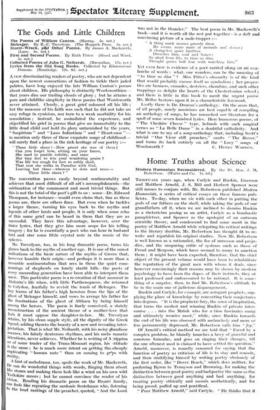The Gods and Little Children
The Poems of William Canton. (Harrap. 5s. net.) Collected Poems of John G. Neihardt. (Macmillan. 17s. net.) Lyrics from the Old Song Books. Collected by Edmonstone
Duncan. (Routledge. 12s. 6d. net.) •
A FEW discriminating readers of poetry, who arc not dependent upon the newest concoctions of fashion to tickle their jaded palates, have long enjoyed the late William Canton's poems about children. His philosophy is distinctly Wordsworthian- that years dim our trailing clouds of glory ; but he attains a pure and childlike simplicity in these poems that Wordsworth never attained. Clearly, a great grief coloured all his life ; but the measure of his faith was such that he did not take an easy refuge in cynicism, nor turn to a weak morbidity for his consolation ; instead, he assimilated the experience, and objectified his grief in poems that give an immortality to the little dead child and hold its glory untarnished by the years. " Suspirium " and " Laus Infantium " and " Heart-ease "- to mention only three of these exquisite songs of childhood— will surely find a place in the rich heritage of our poetry :— " These little shoes I—How proud she was of these I
Can you forget how, sitting on your knees, She used to prattle volubly, and raise Her tiny feet to win your wondering praise Was life too rough for feet so softly shod, That now she walks in Paradise with God,
Leaving but these—whereon to dote and muse—
These little shoes ? "
The convention passes easily beyond sentimentality and achieves that most difficult of all art's accomplishments—the sublimation of the commonest and most trivial things. But this is not the total of the poet's gift to us : some—Dr. Edward Thompson, for instance—would even claim that, fine as these poems are, there are others finer. But even when he tackles a larger theme, turning his eyes back to the myths and legends of other lands and people, it is only when some echo of this same grief can be heard in them that they are as successful. They have this advantage, however, over the tinier lyrics, that they give him more scope for his telling imagery ; for he is essentially a poet who can hear in bud and bird and star some little crystal note in the music of the spheres.
Mr. Trevelyan, too, in his long dramatic poem, turns his glance back to the myths of another age. It is one of the surest indications of the basic nature of the myths of Greece that, however humble their origin—and perhaps it is more than a romantic sentimentalism that sees in them the quiet corn- munings of shepherds on lonely starlit hills—the poets of every succeeding generation have been able to interpret them anew. This particular poem is a re-creation of that moment in Atalanta's life when, with little Parthenopacus, she returned to Calydon, fearfully to revisit the tomb of Meleager. The boy learns of his father's high heroism from the lips of the ghost of Meleager himself, and vows to avenge his father for the frustrations of the ghost of Althaea by being himself among the heroes. The poem is finely conceived, a stately reconstruction of the ancient theme of a mother-love that feels it must oppose the daughter-in-law. Mr. Trevelyan retains, by his clean supple style, all the dignity of the Greek legend, adding thereto the beauty of a new and revealing inter- pretation. That is what Mr. Neihardt, with his noisy gfrandiose manner, his falsely dexterous rhythms, and his melts ramatic intentions, never achieves. Whether he is writing of A 7ippina or of some trader of the Trans-Missouri region, his attitude is the same ; he is much more intent on getting the,,cheaply
captivating " human note " than on coming to grips with reality.
A hint of melodrama, too, spoils the work of Mr. Mackereth. Ile can do wonderful things with words, flinging them about like stones and making them lash like a wind on his own wild Yorkshire moors ; but he cannot convince the reader of his °vis ion. Reading his dramatic poem on the Brontë family, one feels like repeating the sardonic Scotehman who, listening to the loud raritingg of the preachef, quoted; " And the Lord
was not„in the thunder." The best poem in Mr. Mackereth 's
book—and it is worth all the rest put together—is a deft and convincing picture of a mole-trapper :— " A thing meek mosses gravely dress
He seems, mute mate of mounds and stones ; A changeless quiet. limitless Drenches him, soul and bones : So aloof from life, to time so dim, Thought grows half fear with watching him."
Yet even here is evidence of a poet carried along on an ava- lanche of words : what, one wonders, can be the meaning of " to time so dim " ? Miss Fitter's obscurity is of the kind that would probably excuse itself as symbolism ; her proper- ties are banners, crusades, destriers, cherubim, and such other trappings as delight the hearts of the Chestertonian school ; and there is little in this book to merit the urgent praise Mr. Belloc bestows upon it in a characteristic foreword.
Lastly there is Dr. Duncan's anthology. On the score that, of all people, surely musicians are best capalle of compiling an anthology of songs, lie has ransacked our literature for a spoil of some seven hundred lyrics. Here humorous poems, of " The Cheshire Cheese " type, hobnob with such magical verses as " La Belle Dame " in a doubtful catholicity. And What is one to say of a song-anthology that, including Scott's trivial " Our Vicar still preaches," omits " The Rover," and turns its back entirely on all the " Lucy " songs of


























































 Previous page
Previous page